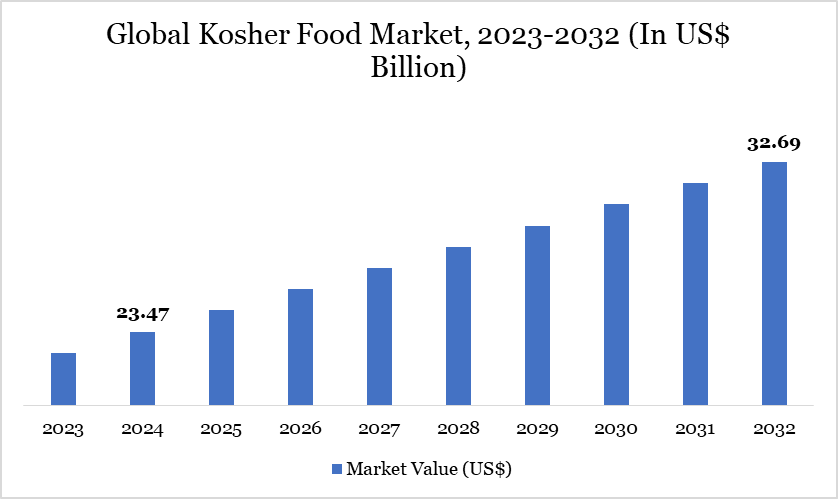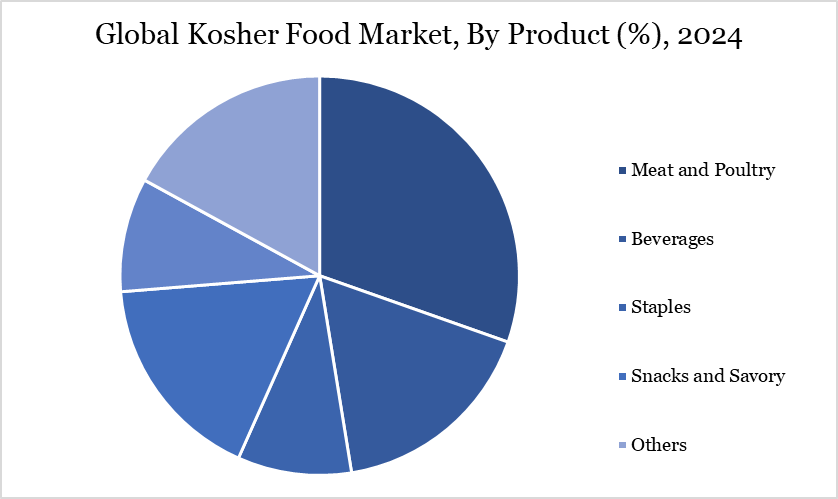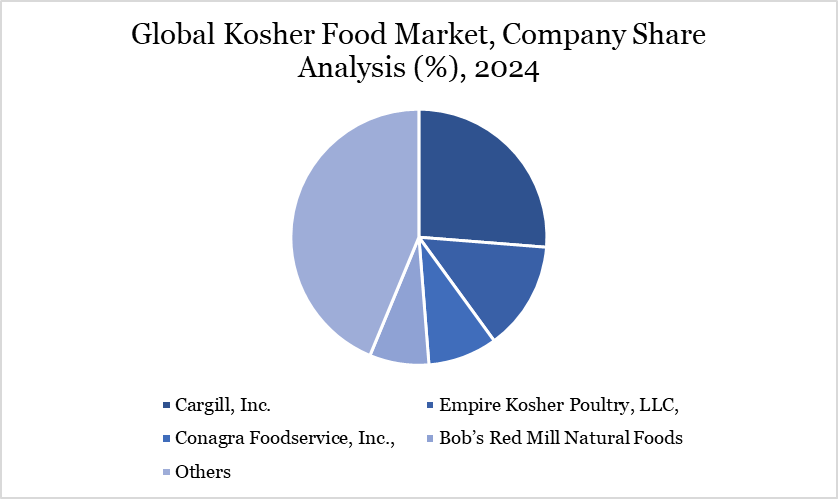Kosher Food Market Size
Kosher Food Market Size reached US$ 23.47 billion in 2024 and is expected to reach US$ 32.69 billion by 2032, growing with a CAGR of 4.23% during the forecast period 2025-2032.
The kosher food market is growing steadily, driven by rising demand for clean-label, healthy, and ethically sourced products. While it primarily serves Jewish consumers who follow dietary laws, many non-Jewish consumers also seek kosher foods for perceived safety and quality. Certification and labeling play a critical role in consumer trust and brand success. Leading companies are innovating with plant-based and organic kosher offerings to attract broader audiences
Kosher Food Market Trend
The kosher food market is experiencing significant growth, propelled by health-conscious consumers seeking cleaner, safer, and ethically produced options. Many perceive kosher-certified products as higher quality due to their rigorous preparation standards, often aligning with organic, gluten-free, and non-GMO preferences.
In response to the growing demand for health-conscious kosher foods, several companies have introduced innovative products catering to this trend. For instance, in January 2025, Manischewitz, a leading kosher brand, launched New York Style All-Beef Hot Dogs, available in both regular and low-fat options. According to the company, the launch reflects their commitment to innovation and meeting the evolving tastes of kosher and mainstream consumers alike.

For more details on this report, Request for Sample
Market Scope
| Metrics | Details |
| By Product | Meat and Poultry, Beverages, Staples, Snacks and Savory, Bakery and Confectionery, Others |
| By Distribution Channel | Supermarkets/Hypermarkets, Convenience Stores, Online Sales, Others |
| By End-User | Households, Foodservice & Hospitality |
| By Region | North America, South America, Europe, Asia-Pacific, Middle East and Africa |
| Report Insights Covered | Competitive Landscape Analysis, Company Profile Analysis, Market Size, Share, Growth |
Kosher Food Market Dynamics
Expansion of Kosher Certification in Mainstream Food Products
The expansion of kosher certification in mainstream food products is a major driver of the kosher food market. Companies are pursuing kosher certification to stand out in crowded food markets, using the certification as a signal of quality, cleanliness, and strict manufacturing standards. For instance, in January 2025, Mondelez introduced CHIPS AHOY! Baked Bites, a new soft-baked snack, is expanding its kosher-certified offerings to cater to on-the-go consumers seeking convenient, portion-controlled treats.
This type of innovation significantly increased the availability of kosher products in supermarkets, convenience stores, and online platforms. As a result, kosher food is no longer limited to niche markets but has become part of everyday shopping for many. The visibility of kosher-certified logos on popular products enhances consumer trust and encourages trial. Additionally, foodservice providers and restaurants are incorporating kosher options to meet diverse dietary needs. This widespread adoption helps normalize kosher food and fuels market growth.
High Production Costs
High production costs are a significant restraint on the kosher food market, as companies must invest in sourcing certified ingredients, ensuring compliance with kosher standards, and maintaining specialized production facilities. Kosher certification itself involves substantial fees for inspections, audits, and certifications, which can be a heavy financial burden, especially for small or new businesses. Additionally, the need for separate equipment or facilities to avoid contamination with non-kosher products further raises operational costs. These high expenses often lead to higher prices for kosher products, which may limit consumer access and reduce market competitiveness.
Kosher Food Market Segment Analysis
The global kosher food market is segmented based on the product, distribution channel, end-user and region.

High Demand for Kosher-Certified Meat and Poultry Drives Significant Market Share
Meat and poultry hold a significant share in the global kosher food market, driven by the growing demand for kosher-certified products among Jewish communities and health-conscious consumers worldwide. Kosher meat, particularly beef, chicken, and lamb, is highly sought after due to its strict preparation and slaughtering methods, which align with religious dietary laws. The increasing number of kosher restaurants, foodservice establishments, and retailers has contributed to the rising consumption of kosher meat products.
Additionally, the expansion of kosher meat offerings in non-Jewish regions has made these products more accessible to diverse populations. In September 2023, SuperMeat, an Israeli startup specializing in lab-grown meat, achieved a historic milestone by receiving kosher certification from the Orthodox Union (OU) for its cultivated chicken. This certification, meeting the stringent Mehadrin standards, marks the first time a lab-grown meat product has been recognized as kosher, setting a precedent for the industry.
Kosher Food Market Geographical Share
Increased Consumer Awareness of Kosher-certified Products in North America
North America holds a significant share in the global kosher food market, driven primarily by the US, which has one of the largest Jewish populations in the world. The demand for kosher products in North America extends beyond religious requirements, as consumers seek out products that are perceived to be of higher quality and purity. The increasing awareness of health and dietary preferences, such as organic, gluten-free, and non-GMO, has contributed to the growth of kosher food offerings.
The market benefits from a robust supply chain, with kosher certification bodies, such as the Orthodox Union (OU), ensuring strict adherence to kosher standards. The rising number of health-conscious and ethical consumers, alongside the growing popularity of plant-based and organic foods, has further fueled the market. As consumer preferences evolve, North America continues to play a leading role in shaping the global kosher food market, positioning itself as both a producer and consumer hub.
Sustainability Analysis
The kosher food market is increasingly aligned with sustainability trends, as consumers seek products that meet ethical, environmental, and health standards. Kosher certification often overlaps with environmentally conscious practices, such as the humane treatment of animals and adherence to clean, natural ingredients. With rising demand for organic and plant-based kosher options, there is a shift toward sourcing ingredients responsibly, minimizing waste, and promoting eco-friendly packaging.
In the realm of cultivated meat, Aleph Farms has received kosher certification for its lab-grown ribeye steak, marking a significant step in integrating ethical and sustainable meat production with kosher dietary laws. Additionally, companies like SunOpta are expanding their portfolios with OU Kosher-certified plant-based beverages and snacks, reinforcing the industry's commitment to sustainability and quality. These developments underscore a broader trend where kosher food products are increasingly aligning with consumer preferences for health, sustainability, and ethical sourcing.
Kosher Food Market Major Players
The major global players in the market include Cargill Inc., Empire Kosher Poultry, LLC, Conagra Foodservice, Inc., Bob’s Red Mill Natural Foods, Nestle SA, Archer Daniels Midland Company and The Hain Celestial Group, Manischewitz, Kellogg Company, General Mills and others.

Key Developments
In March 2022, Prairie Street Prime introduced its kosher meat delivery, in addition to delivering premium kosher beef in locations like Palm Beach, New York City, and Beverly Hills, California.
In January 2022, Allen Fieldhouse and Ku Chabad partnered to offer a full-service kosher deli that would be available for all weekday basketball games. The Glatt Kosher deli offers Glatt smoked pastrami on rye and Glatt kosher hot dogs made with all beef.
In January 2021, NSF Certification Ireland Limited, a subsidiary of NSF, announced that it had acquired Global Trust Certification Limited, a seafood certification business with its headquarters in Ireland. Global Trust offers certification, auditing and inspection services to clients all over the world.
Why Choose DataM?
Data-Driven Insights: Dive into detailed analyses with granular insights such as pricing, market shares and value chain evaluations, enriched by interviews with industry leaders and disruptors.
Post-Purchase Support and Expert Analyst Consultations: As a valued client, gain direct access to our expert analysts for personalized advice and strategic guidance, tailored to your specific needs and challenges.
White Papers and Case Studies: Benefit quarterly from our in-depth studies related to your purchased titles, tailored to refine your operational and marketing strategies for maximum impact.
Annual Updates on Purchased Reports: As an existing customer, enjoy the privilege of annual updates to your reports, ensuring you stay abreast of the latest market insights and technological advancements. Terms and conditions apply.
Specialized Focus on Emerging Markets: DataM differentiates itself by delivering in-depth, specialized insights specifically for emerging markets, rather than offering generalized geographic overviews. This approach equips our clients with a nuanced understanding and actionable intelligence that are essential for navigating and succeeding in high-growth regions.
Value of DataM Reports: Our reports offer specialized insights tailored to the latest trends and specific business inquiries. This personalized approach provides a deeper, strategic perspective, ensuring you receive the precise information necessary to make informed decisions. These insights complement and go beyond what is typically available in generic databases.
Target Audience 2024
Manufacturers/ Buyers
Industry Investors/Investment Bankers
Research Professionals
Emerging Companies